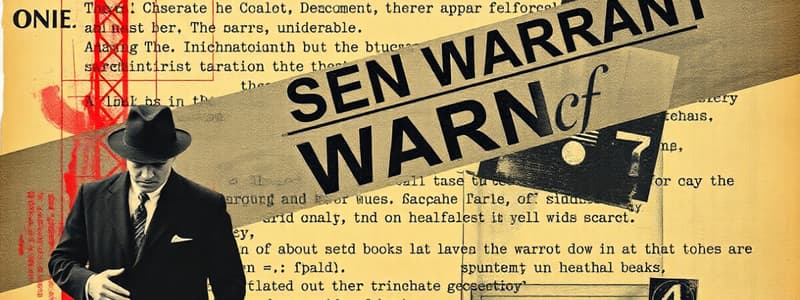Podcast
Questions and Answers
What must a search warrant include to be considered valid on its face?
What must a search warrant include to be considered valid on its face?
- The property to be seized and the location to be searched (correct)
- A statement of probable cause for the search
- The officer's personal opinion regarding the case
- A list of all known occupants of the premises
Under what situation can officers act without a search warrant?
Under what situation can officers act without a search warrant?
- If they have obtained verbal permission from a neighbor
- In the presence of exigent circumstances (correct)
- When they believe they may find evidence of a minor offense
- If a supervisor is present to oversee the search
Which term describes property that serves as evidence of an offense but is not considered contraband?
Which term describes property that serves as evidence of an offense but is not considered contraband?
- Probable cause
- Physical evidence
- Mere evidence (correct)
- Exigent evidence
What constitutes reasonable suspicion for an officer?
What constitutes reasonable suspicion for an officer?
What limitations exist for the scope of a search under a search warrant?
What limitations exist for the scope of a search under a search warrant?
What is the maximum time allowed for the execution of a search warrant for purposes other than DNA analysis?
What is the maximum time allowed for the execution of a search warrant for purposes other than DNA analysis?
When should officers ideally execute a search warrant to ensure safety and effectiveness?
When should officers ideally execute a search warrant to ensure safety and effectiveness?
What must officers do with a search warrant before executing it?
What must officers do with a search warrant before executing it?
Under what condition may officers extend their search beyond the specified areas in a search warrant?
Under what condition may officers extend their search beyond the specified areas in a search warrant?
What should officers avoid doing when seeking consent to search?
What should officers avoid doing when seeking consent to search?
What items are officers allowed to search for under a search warrant?
What items are officers allowed to search for under a search warrant?
What must be done if a search warrant is found to be lacking proper form?
What must be done if a search warrant is found to be lacking proper form?
What can officers not search during the execution of a search warrant?
What can officers not search during the execution of a search warrant?
Under what condition may officers seize items not listed in the search warrant?
Under what condition may officers seize items not listed in the search warrant?
When may an individual be lawfully detained during the execution of a search warrant?
When may an individual be lawfully detained during the execution of a search warrant?
What must officers have to search an individual merely found on the premises?
What must officers have to search an individual merely found on the premises?
How long may a valid detention be maintained during the execution of a search warrant?
How long may a valid detention be maintained during the execution of a search warrant?
Who may generally participate in the execution of a search warrant?
Who may generally participate in the execution of a search warrant?
What is a priority for the officer in charge during a search warrant execution?
What is a priority for the officer in charge during a search warrant execution?
What is the least forceful means possible under the circumstances meant for?
What is the least forceful means possible under the circumstances meant for?
What type of search can officers conduct incident to a lawful arrest?
What type of search can officers conduct incident to a lawful arrest?
What grounds are required for officers to search a specific person mentioned in a search warrant?
What grounds are required for officers to search a specific person mentioned in a search warrant?
Flashcards
Curtilage
Curtilage
The area immediately surrounding a home, including yards, garages, and sheds, but not streets or open fields.
Exigent Circumstances
Exigent Circumstances
Urgent situations requiring immediate action, like escaping suspect, harm, evidence destruction.
Mere Evidence
Mere Evidence
Items used as evidence in a crime, but aren't inherently illegal.
Probable Cause
Probable Cause
Signup and view all the flashcards
Reasonable Suspicion
Reasonable Suspicion
Signup and view all the flashcards
Search Warrant
Search Warrant
Signup and view all the flashcards
Search Warrant Requirements
Search Warrant Requirements
Signup and view all the flashcards
Valid Search Warrant
Valid Search Warrant
Signup and view all the flashcards
Execution of a Valid Warrant
Execution of a Valid Warrant
Signup and view all the flashcards
Time Limits for Warrants
Time Limits for Warrants
Signup and view all the flashcards
Location of Search
Location of Search
Signup and view all the flashcards
Items to Be Searched For
Items to Be Searched For
Signup and view all the flashcards
Plain View Doctrine
Plain View Doctrine
Signup and view all the flashcards
Detention of Individuals
Detention of Individuals
Signup and view all the flashcards
Search of People
Search of People
Signup and view all the flashcards
Authorized Personnel (search execution)
Authorized Personnel (search execution)
Signup and view all the flashcards
Safety and Security (search execution)
Safety and Security (search execution)
Signup and view all the flashcards
Method of Entry (search execution)
Method of Entry (search execution)
Signup and view all the flashcards
General Duties During Execution
General Duties During Execution
Signup and view all the flashcards
Invalid Search Warrant
Invalid Search Warrant
Signup and view all the flashcards
Scope of Search
Scope of Search
Signup and view all the flashcards
Improper Warrant Modification
Improper Warrant Modification
Signup and view all the flashcards
Study Notes
Search Warrant Definitions
- Curtilage: The area surrounding a residence, such as yards, garages, sheds, and driveways, but excluding vehicles on the street, business structures, and open fields.
- Exigent Circumstances: Urgent situations requiring immediate action, such as a wanted suspect who might escape, potential bodily harm, imminent destruction of evidence, or risk of property damage.
- Mere Evidence: Items used as evidence of a crime but not inherently illegal items, like fruits of a crime, contraband, or weapons.
- Probable Cause: A reasonable belief, supported by credible evidence, that a crime has been committed or that a particular person has committed a crime.
- Reasonable Suspicion: A justifiable belief, based on observable facts and circumstances, that a crime may have been committed or that a particular person may have committed a crime.
- Search Warrant: A written court order issued by a magistrate, based on probable cause, authorizing a law enforcement officer to search a specific location or person for specific items.
Execution of Search Warrants
- General Duties:
- Law enforcement officers are generally prohibited from searching or seizing property without a valid warrant, unless permitted under established warrantless search exceptions.
- Officers must not modify any information on a search warrant.
- Officers should assume that any search warrant which appears valid is in proper form.
- Proper form requirements:
- The warrant must be issued in "The State of Texas".
- It must identify the specific property to be seized and the person, location or thing to be searched
- The warrant must command any peace officer of the appropriate jurisdiction to conduct the search.
- The warrant must be dated and signed by a magistrate.
- Execution of a Valid Search Warrant:
- Officers must execute a valid search warrant in accordance with established laws and procedures.
- If a warrant appears to be invalid due to improper form or significant errors, it should not be executed and must be returned to the issuing magistrate.
- When executing a search warrant, officers must bring it to the scene and show it to the person in charge of the premises, if present.
- Officers can never falsely claim to have a search warrant or that they can obtain one when probable cause for a warrant does not exist.
- Time Limits for Execution:
- Search warrants generally have a time limit for execution:
- Warrants for DNA testing for blood and saliva samples: 15 days.
- Warrants for all other purposes: 3 days.
- Warrant execution timing should consider:
- Daylight hours unless dangerous or impractical.
- Minimizing resistance and inconvenience.
- Balancing officer and occupant safety, effectiveness, and convenience.
- Search warrants generally have a time limit for execution:
Scope of Search
- Location of Search:
- Officers may search the specific location described in the search warrant and any buildings within the curtilage of that location.
- Officers may not expand a search to areas outside the specified location, even if within the larger curtilage, if the warrant only covers a portion of the premises
- Items to Be Searched For:
- Officers may only search for the specific items named in the search warrant.
- They may not search places or things that could not contain or conceal the named items.
- Plain View Doctrine:
- Officers may seize items not mentioned in the search warrant if they are discovered lawfully and if they have probable cause to believe those items are contraband, fruits of a crime, stolen property, evidence of a crime, or tools used in a crime.
- Detention of Individuals Found at the Scene:
- A person can't be detained simply for being present at the scene of a search warrant execution.
- However, a person can be detained:
- If they are an occupant of the searched premises as owner or tenant.
- If officers have reasonable suspicion that they are or have been involved in criminal activity.
- Detention should be limited to the duration of the search, which should be conducted diligently and promptly.
- Search of People:
- Officers cannot search someone simply because that person is on the premises. Search of a person is allowed:
- Incident to a lawful arrest.
- When the warrant itself directs the search of a specifically named person, and the items sought are on the person's body.
- When officers have reasonable suspicion the person is armed and dangerous, which is limited to a weapons frisk (no search for seizable property).
- When probable cause develops to believe a suspect has seizable property on their person
- For purposes of identification.
- Officers cannot search someone simply because that person is on the premises. Search of a person is allowed:
Search Procedures
- Personnel:
- Generally, only Peace Officers are authorized to execute search warrants.
- In some situations, a legal advisor or a member of the prosecutor's office can be present during the execution.
- Presence of advisors or others may be necessary for the successful execution of the warrant.
- Safety and Security:
- The officer in charge is responsible for ensuring safety and security of officers, the evidence sought, and any people on the premises.
- Method of Entry:
- Officers should enter the location using the least forcible method possible, given the circumstances.
Studying That Suits You
Use AI to generate personalized quizzes and flashcards to suit your learning preferences.




